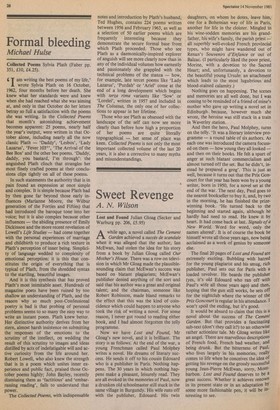Sweet Revenge
A. N. Wilson
Lost and Found Julian Gloag (Secker and Warburg pp. 206, £5.95) Awhile ago, a novel called The Cement Garden achieved a succes de scandale when it was alleged that the author, Ian McEwan, had stolen the idea for his story from a book by Julian Gloag called Our Mother's House. There was a row on television in which Mr Gloag made the plausiblesounding claim that McEwan's success was based on blatant plagiarism; McEwan's publisher denied anything of the sort and said that his author was a great and original talent; and the chairman, someone like Robert Robinson, made bland remarks to the effect that this was the kind of coincidence which could happen to anyone who took the risk of writing a novel. For some reason, I never got round to reading either book, and I had almost forgotten the telly programme.
Now we have Lost and Found, Mr Gloag's new novel, and it is brilliant. The story is as follows. At the end of the war, a young Frenchman called Paul Molphey writes a novel. He dreams of literary success. He sends it off to his cousin Edouard who is a publisher in Paris. Nothing happens. The 30 years in which nothing happens make a pleasant, leisurely read. They are all evoked in the memories of Paul, now a drunken old schoolmaster still stuck in the same village in Burgundy. His wife runs off with the publisher, Edouard. His twin daughters, on whom he dotes, leave him, one for a Bohemian way of life in Paris, another for life in the cloister. Mingled in his wine-sodden memories are his grandfather, his wife's family, the parish priest — all superbly well-evoked French provincial types, who might have wandered out of Renan's Souvenirs d'Enfance or out of Balzac. (I particularly liked the poor priest, Morine, with a devotion to the Sacred Heart; and, unfortunately, a devotion to the beautiful young Ursule: an attachment which leads to the most lugubrious and blood-stained calamity.) Nothing goes on happening. The scenes and memories are all well done, but I was coming to be reminded of a friend of mine's mother who gave up writing a novel set in Edinburgh because, however much she wrote, the heroine was still stuck in a train in Waverley station.
And then the hero, Paul Molphey, turns on the telly. 'It was a literary interview programme — a round table of six authors. As each one was introduced the camera focussed on them — how young they all looked — and then on their books. He felt a spurt of anger at such blatant commercialism and almost turned off the set. But he didn't, instead he prepared a grog'. This is just as well, because it turns out that the Prix Goncourt for that year has been won by a young writer, born in 1950, for a novel set at the end of the war. The next day, Paul goes to the nearest bookseller to buy it, and, by two in the morning, he has finished the prizewinning book. 'He turned back to the beginning and started again, although he hardly had need to read. He knew it by heart. It had come back at last. Signals of a New World. Word for word, only the names altered'. It is of course the book he himself wrote all those years ago, now being acclaimed as a work of genius by someone else.
The final 20 pages of Lost and Found are extremely exciting. Bubbling with hatred for the young plagiarist and his smug, rich publisher, Paul sets out for Paris with a loaded revolver. He beards the publisher (yes, it's old Edouard who ran off with Paul's wife all those years ago) and then, hoping that the gun still works, he sets off for the nightclub where the winner of the Prix Goncourt is regular in his attendance. I won't spoil the ending, but it's good.
It would be absurd to claim that this is a novel about the success of The Cement Garden. But that provides a fascinating sub-text (don't they call it?) to an otherwise rather actionless tale. Mr Gloag writes like an angel. There are marvellous descriptions of French food, French bad weather, and being drunk. But the bitterness of Paul, who lives largely in his memories, really comes to life when he conceives the idea of getting his revenge on the grossly successful young Jean-Pierre McEwan, sorry, Montbarbon. Lost and Found deserves to be a great success. Whether it achieves renown in its present state or in an adaptation bY some more fashionable pen, it will be Interesting to see.


































 Previous page
Previous page